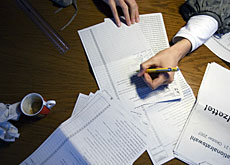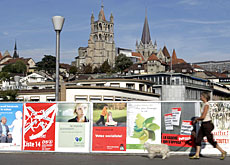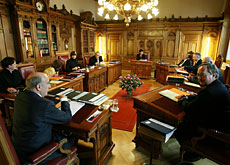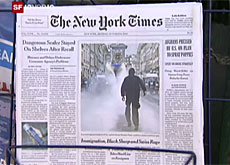Election marks end of heated campaign

Swiss voters this Sunday will be choosing a new parliament for the next four years following an unusually divisive and costly pre-election campaign.
It took place amid increasing tension over allegedly racist propaganda by the rightwing Swiss People’s Party – one of four parties in government. The People’s Party, together with the Greens, is forecast to emerge with the largest gains.
Final results are expected in the early hours of Monday, but analysts say there is unlikely to be a major change in the make-up of the parliament which has been dominated by the four main parties for decades.
The People’s Party ran a high-profile campaign and is likely to come out on top, according to latest opinion polls.
“The People’s Party might again increase its share of the vote, but not as much as in 2003,” said Claude Longchamp of the gfs.berne polling and research institute.
In 2003 they won just under 27 per cent of the vote and look set to consolidate their position.
The centre-left Social Democrats and the centre-right Radicals are expected to drop to about 22 and 15 per cent respectively, while the Christian Democrats could gain votes, bringing the two centre-right parties on a par.
The biggest increase is forecast for the Greens which would jump from 7.4 per cent to about ten per cent.
Aggressive campaign
A series of squabbles in the run-up to election day have increased voter interest which could result in an above-average turnout of around 50 per cent.
The campaign has been dominated by controversy over Justice Minister Christoph Blocher and his People’s Party’s hard-line stance on immigrants and crime.
This has pushed other issues, such as climate change, taxes, social security and unemployment into the background.
The increasingly aggressive tone of the campaign escalated at a rally in the capital, Bern, two weeks ago.
Police clashed with leftwing militants who tried to interrupt an outdoor gathering of the People’s Party and their supporters.
Faces
Analysts say for the first time in nearly 50 years the parliamentary elections have been focusing on the personalities of the cabinet ministers, in particular Blocher, but also Economics Minster Doris Leuthard and Foreign Minister Micheline Calmy-Rey.
Traditionally ministers act neither as party leaders nor are they directly accountable to their political parties.
It is widely believed to have been the most expensive election campaign in Swiss history with parties spending at least SFr50 million ($42 million).
However, no detailed figures are available, and Switzerland does not have a transparency law on the financing of political parties.
A group of observers from the Organization for Security and Cooperation in Europe (OSCE) has been visiting Switzerland to study the electoral system, notably the postal vote.
More than four out of five Swiss, including most of the 111,000 Swiss expatriates who have registered to vote, cast their ballot by mail, according to the federal administration.
There are more than 3,100 candidates running for the 246 seats in the House of Representatives and the Senate for the next four-year term.
Both chambers will also choose the new cabinet in a joint meeting in December.
swissinfo, Urs Geiser
More than 3,000 candidates in 26 constituencies, which are identical with the country’s cantons, are standing for the House of Representatives.
44 Swiss expatriates are also standing for election.
There are at least 130 candidates for the Senate.
Voters choose the 200 members of the House of Representatives and most members of the 46 Senate for the next four-year term.
The four main parties – People’s Party, Social Democrats, Radicals and Christian Democrats – control more than 75% of the seats in parliament and share the seven cabinet posts.
An alliance of Greens and another leftwing party is the biggest opposition grouping with 14 seats.
Both houses of parliament will meet on December 12 to elect the new cabinet.
People’s Party: 26.7% and 63 seats
Social Democrats: 23.3% and 61 seats
Radical Party: 17.3% and 50 seats
Christian Democrats: 14.4% and 43 seats
Greens: 7.4% and 13 seats
Others: 10.9% and 16 seats
Total: 100% and 246 seats

In compliance with the JTI standards
More: SWI swissinfo.ch certified by the Journalism Trust Initiative




You can find an overview of ongoing debates with our journalists here. Please join us!
If you want to start a conversation about a topic raised in this article or want to report factual errors, email us at english@swissinfo.ch.